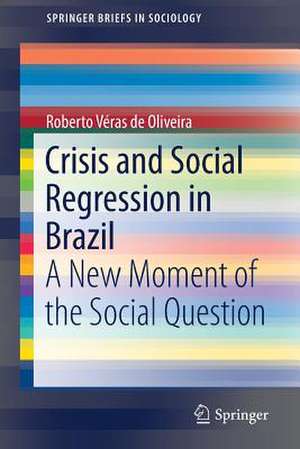Crisis and Social Regression in Brazil: A New Moment of the Social Question: SpringerBriefs in Sociology
Autor Roberto Véras de Oliveiraen Limba Engleză Paperback – 16 aug 2018
Din seria SpringerBriefs in Sociology
-
 Preț: 380.07 lei
Preț: 380.07 lei -
 Preț: 347.36 lei
Preț: 347.36 lei -
 Preț: 444.35 lei
Preț: 444.35 lei -
 Preț: 379.86 lei
Preț: 379.86 lei -
 Preț: 381.21 lei
Preț: 381.21 lei -
 Preț: 378.54 lei
Preț: 378.54 lei -
 Preț: 376.59 lei
Preț: 376.59 lei -
 Preț: 447.62 lei
Preț: 447.62 lei -
 Preț: 379.68 lei
Preț: 379.68 lei -
 Preț: 380.25 lei
Preț: 380.25 lei -
 Preț: 361.03 lei
Preț: 361.03 lei -
 Preț: 175.76 lei
Preț: 175.76 lei -
 Preț: 379.86 lei
Preț: 379.86 lei -
 Preț: 413.45 lei
Preț: 413.45 lei -
 Preț: 413.84 lei
Preț: 413.84 lei - 15%
 Preț: 463.68 lei
Preț: 463.68 lei -
 Preț: 376.59 lei
Preț: 376.59 lei -
 Preț: 444.74 lei
Preț: 444.74 lei -
 Preț: 174.44 lei
Preț: 174.44 lei -
 Preț: 375.84 lei
Preț: 375.84 lei -
 Preț: 379.68 lei
Preț: 379.68 lei -
 Preț: 260.18 lei
Preț: 260.18 lei -
 Preț: 376.59 lei
Preț: 376.59 lei -
 Preț: 380.63 lei
Preț: 380.63 lei -
 Preț: 261.15 lei
Preț: 261.15 lei -
 Preț: 263.67 lei
Preț: 263.67 lei -
 Preț: 346.86 lei
Preț: 346.86 lei -
 Preț: 342.03 lei
Preț: 342.03 lei -
 Preț: 260.38 lei
Preț: 260.38 lei -
 Preț: 343.39 lei
Preț: 343.39 lei -
 Preț: 378.34 lei
Preț: 378.34 lei -
 Preț: 378.34 lei
Preț: 378.34 lei -
 Preț: 410.94 lei
Preț: 410.94 lei -
 Preț: 376.59 lei
Preț: 376.59 lei -
 Preț: 377.73 lei
Preț: 377.73 lei -
 Preț: 349.97 lei
Preț: 349.97 lei
Preț: 375.45 lei
Nou
Puncte Express: 563
Preț estimativ în valută:
71.85€ • 78.02$ • 60.35£
71.85€ • 78.02$ • 60.35£
Carte tipărită la comandă
Livrare economică 23 aprilie-07 mai
Preluare comenzi: 021 569.72.76
Specificații
ISBN-13: 9783319994017
ISBN-10: 3319994018
Pagini: 60
Ilustrații: X, 63 p.
Dimensiuni: 155 x 235 mm
Greutate: 0.12 kg
Ediția:1st ed. 2019
Editura: Springer International Publishing
Colecția Springer
Seria SpringerBriefs in Sociology
Locul publicării:Cham, Switzerland
ISBN-10: 3319994018
Pagini: 60
Ilustrații: X, 63 p.
Dimensiuni: 155 x 235 mm
Greutate: 0.12 kg
Ediția:1st ed. 2019
Editura: Springer International Publishing
Colecția Springer
Seria SpringerBriefs in Sociology
Locul publicării:Cham, Switzerland
Cuprins
Chapter 1: The Developmentalist Contradictory Promise.- Chapter 2: The Interpretations of Brazilian Society: What Development?.- Chapter 3: Democratic Transition and the Promise of a Wider Citizenship.- Chapter 4: Neoliberal Era and the Denial of Social Rights.- Chapter 5: Lula/Dilma Era: Neodevelopmentalism and New Social Question.- Chapter 6: Challenges of the Social Question in the Current Scenario.
Notă biografică
Roberto Véras de Oliveira is an Associate Professor of Sociology at the Federal University of Paraíba (UFPB), Brazil. He holds a PhD in Sociology from the University of São Paulo (USP) and was a visiting scholar in the Institute for Research on Labor and Development at the University of California, Los Angeles (UCLA). Professor Véras de Oliveira is also a researcher of the Brazilian National Council for Scientific and Technological Development (CNPq), with a productivity grant from the same institution.
Textul de pe ultima copertă
This is the first book published in English to present a concise but panoramic overview of the social, economic and political roots of the current Brazilian crisis. By situating former president Dilma Rousseff’s impeachment in the wider context of the historical struggle for social rights, citizenship and democracy in the country, the book provides a conceptual framework that will allow foreign readers to better understand the apparent contradiction of a rising regional power that all of a sudden entered in one of the worst economic, social and political crisis of its history.
This book will be of interest to a wide range of social scientists (such as sociologists, economists, historians and political scientists) interested in labor and citizenship issues in developing countries like Brazil, as well as for social agents (from the public and private spheres) with practical involvement with such issues, such as trade unionists, leaders and advisors of business organizations, policy-makers, politicians, NGO activists and technicians.
Caracteristici
First book in English to analyze the historical and sociological roots of the current Brazilian crisis Provides a conceptual framework that will allow foreign readers to better understand the collapse of a rising regional power Situates former president Dilma Rousseff’s impeachment in the wider context of the historical struggle for social rights in the country
